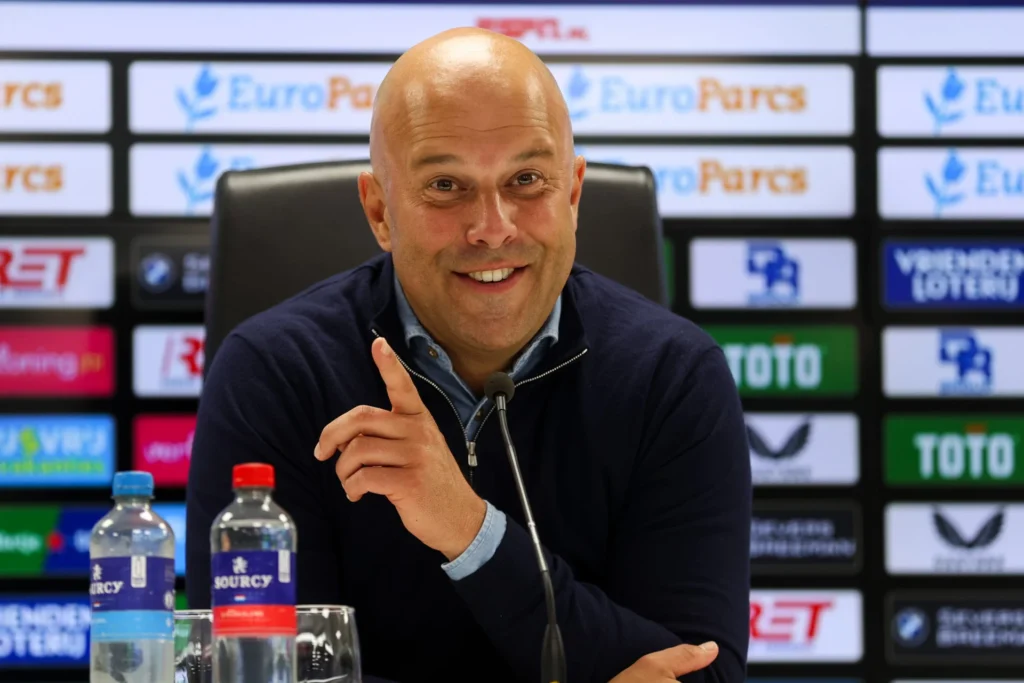One of the primary reasons for picking Arne Slot as Jurgen Klopp’s successor was that his arrival eliminated the need to rip up Liverpool’s plans.
One of the primary reasons for picking Arne Slot as Jurgen Klopp’s successor was that his arrival eliminated the need to rip up the Liverpool blueprints and start from scratch.
Under Klopp, the club had built a squad that was designed to thrive within his tactical framework, with a new-look midfield sanctioned for around £150 million, just months after Cody Gakpo was brought in for around £40 million and a year after Darwin Nunez arrived from Benfica for an initial £64 million.
With the arrival of Luis Diaz in January 2022 for a cost that might grow to £50 million, it’s evident that the foundation for what was believed to be a second great Reds team under Klopp’s leadership was gradually being laid.
The Reds spent about £304 million on team building, which is why starting from zero with a new coach whose ideas were significantly from Klopp’s would have been detrimental to the long-term plan.
Klopp’s decision to step down at the conclusion of the season surprised both the club and its owners, Fenway Sports Group, when he announced it in November. Despite this, the core of a top-tier squad remains, thus hiring a coach with a completely different mindset would have been counterproductive to the years of costly recruitment that had already taken place. This summer will be about progress rather than upheaval.
That is why describing their managerial replacement process as “data driven” was more than just lip service. Liverpool, as one of the leading European clubs in terms of data analysis, would stick to their principles throughout the search, even if the results revealed some unexpected options that might not immediately excite fans and would require courage and bravery to see through.
In terms of character, it was accepted thatthere would be no true Klopp successor. The German’s charisma, personality, and acceptance rating among a global fan base were irreplaceable, but that didn’t mean the style of football had to vary too much from the hard-running, high-pressing diet that supporters had been fed for much of the last decade.
Throughout his tenure at Anfield, Klopp often preferred a 4-3-3 formation, notably when the jet-heeled combo of Mohamed Salah and Sadio Mane were at the club together, with Roberto Firmino flourishing in the ‘false 9’ role across the middle.

The now-ex-manager has always claimed that the Brazilian’s brilliance helped define the position, but this ignores the work done on the training pitch to transform Firmino from a struggling attacking midfielder under former manager Brendan Rodgers to a striker who played the position with a selfless streak that benefited Mane and Salah.
Behind them was a midfield that, at its best, was workmanlike but elite. Fabinho, Gini Wijnaldum, and Jordan Henderson worked hard to allow the more creative players to wreak havoc in areas where they might truly hurt the opponent, while also plugging gaps left by rampaging full-backs Trent Alexander-Arnold and Andy Robertson.
The modest modification to Slot’s preferred 4-2-3-1 system theoretically gives for another attacker in the starting lineup, but Liverpool was rarely convinced when Klopp deployed it ad hoc during his spell at Anfield. That could be because there was such little time to attempt and fully implement it before the games it was chosen for, which were mainly when an injury crisis forced it or Liverpool needed goals, such as last year’s Champions League away game against Real Madrid.
However, with more time on the training field to work on the shape more consistently, Slot has the players at his disposal to transition from 4-3-3 to his preferred system. However, due to a lack of depth in the defensive midfield position, a move may be necessary. Wataru Endo is the only natural ‘No.6′ in the senior team, and it would be unrealistic to expect adolescent Stefan Bajcetic to suddenly return to peak form next season after missing the better part of 18 months due to injury.
Alexis Mac Allister can play beside Endo, but the Argentine international appeared most at ease farther forward. Could the 2022 World Cup winner play at No.10 in Slot’s lineup? Harvey Elliott is someone who could be interesting in that particular capacity. The England Under-21s finished the campaign strongly and will be eager to get back on track.
It will be fascinating to see how Slot intends to use the full-backs in his squad, notably Alexander-Arnold, who has been playing as an inverted right-back for over a year.
At their peak, both defenders were critical in providing opportunities for the frontmen, but they struggled with injuries during the season and did not play together nearly enough. It will be interesting to see whether Slot returns Alexander-Arnold to his more traditional, wider position, sticks with the present approach, or completely shifts him to midfield. As perhaps the best passer in the group, committing the England international to long-term instructions will be a crucial decision that must be made quickly.
According to data released by ESPN earlier this month, the two clubs share numerous parallels, which Liverpool’s thorough dive into the data, supervised by director of research Will Spearman, will have revealed. This season, for example, Liverpool had 94 possessions per game, whereas Slot’s Feyenoord had 96 throughout the same span.
Liverpool’s average pass travels 17.1 meters, but Feyenoord’s is 17.2 meters. Under Klopp, the side pushed the ball upfield at an above-average rate of 1.26 meters per second, with Feyenoord even faster at 1.33. The Reds’ opponents completed 77% of their passes, while the sides who faced Slot’s Feyenoord completed 74%. Such parallels are just coincidental, but when taken together, they paint a picture of a comparable playing style.
If Slot is expected to maintain continuity in terms of playing style and overall tactical ethos, the incoming Dutchman must also improve Liverpool’s genuinely dreadful injury record over the past few years.
The appointment of Ruben Peeters, who formerly served as Feyenoord’s head of performance, is a significant move toward rectifying a situation that saw Klopp unable to field as many as 13 first-team players last season due to fitness difficulties. Slot’s openness to accept advances in sports science and the medical aspects of football match preparation was cited as a major factor in his hiring.
“It is a sign of the impact he has had in only two jobs as a head coach that, less than four years after stepping into his first role at AZ Alkmaar, Arne Slot has found himself one of the most sought-after managers in Europe,” according to the respected Coaches Voice. “The Dutchman’s reputation has soared in two seasons at Feyenoord, where he led them to their first Eredivisie title in six years – and only their second of the century.
“Along with Erik ten Hag, he is leading an exciting new generation of Dutch coaches. Slot’s accomplishments in a relatively brief tenure as a head coach have established him as a manager capable of proving his abilities in a more competitive league than the Eredivisie. His teams have been entertaining to watch both in and out of possession. It would be fascinating to see if, like his countryman Ten Hag, he could translate that into the Premier League.”
